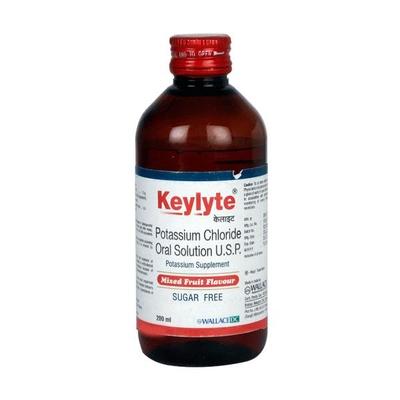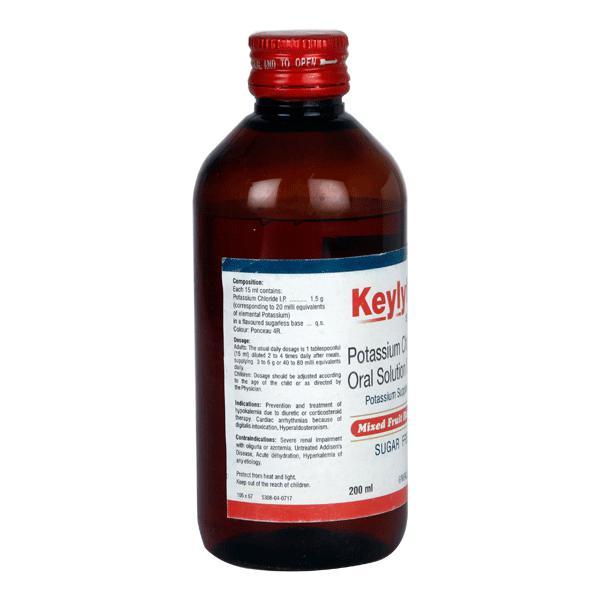

Netmeds First Membership
Quick Links
Introduction About KEYLYTE SYRUP
KEYLYTE SYRUP contains Potassium chloride which belongs to the group of medicines called Minerals and Electrolytes. It is used to manage hypokalemia (low blood potassium levels) in patients who have potassium deficiencies and in patients who take certain medicines that can eliminate potassium from the body (such as furosemide, hydrochlorothiazide or digitalis etc.).
Always take KEYLYTE SYRUP with meals. It should not be taken on an empty stomach as it may lead to gastric irritation. KEYLYTE SYRUP is used only when dietary management with potassium-rich foods or diuretic dose reduction is not effective.
Before taking KEYLYTE SYRUP, inform your doctor if you have any liver or kidney problems. You must also inform your doctor before taking KEYLYTE SYRUP if you are pregnant or breastfeeding women.
The most common side effects of taking KEYLYTE SYRUP are nausea, vomiting, stomach pain, bloating and diarrhea. Consult your doctor if any of the symptom worsens. You must also inform your doctor if you experience severe vomiting with stomach pain and bloody stools.
Uses Of KEYLYTE SYRUP
- Manage and manages hypokalemia (low blood potassium levels)
How KEYLYTE SYRUP Works
KEYLYTE SYRUP works by restoring the deficient levels of potassium in the body. It supplements our body with sufficient potassium which is necessary for the proper functioning of the heart, bones, muscles, kidneys, and nerves.
How to use KEYLYTE SYRUP
Take KEYLYTE SYRUP as advised by your physician. Shake well before use. Measure the required quantity of this medicine in the measuring cup provided and consume it. It should be taken preferably with meals to avoid the incidence of gastrointestinal side effects.
Your doctor will decide the correct dose and duration of the therapy for you depending upon your age, body weight and disease condition.
Side Effects Of KEYLYTE SYRUP
Common
- nausea or vomiting
- stomach pain or discomfort
- flatulence, diarrhea
How To Manage Side Effects
Nausea or vomiting:
Take KEYLYTE SYRUP with, or just after meals. Stick to simple meals. Avoid eating rich or spicy food.
Stomach Pain:
Rest and relax. Eat and drink slowly or try to have smaller and more frequent meals. Take KEYLYTE SYRUP with meals to avoid unwanted gastrointestinal side effects. Do not self-manage stomach pain on your own. Consult your doctor if you experience severe stomach pain with bloody stools.
Diarrhoea:
Drink lots of fluids, such as water, electrolytes, or fruit juice to keep yourself hydrated. Do not take any anti-diarrheal medications on your own without consulting your doctor. If you experience diarrhoea for a prolonged period, consult your doctor for advice.
Skin rash:
Avoid hot showers because hot water can irritate your skin further. Do not scratch the affected area. Use protective clothing while going outdoors. Regularly moisturize your skin. Consult your doctor if the symptom worsens.
Warning & Precautions
Pregnancy
KEYLYTE SYRUP should be used in pregnant women only if it is considered necessary by your doctor. Therefore, consult your doctor for advice before taking it.
Breastfeeding
KEYLYTE SYRUP should be used with caution in breastfeeding women as it can pass through breast milk. Therefore, consult your doctor for advice before taking it.
Kidney
KEYLYTE SYRUP should be used with caution in patients with kidney problems. Therefore, consult your doctor for advice before taking it.
Liver
KEYLYTE SYRUP should be used with caution in patients with liver problems (such as liver cirrhosis). Therefore, consult your doctor for advice before taking it.
Allergy
Do not take KEYLYTE SYRUP if you are allergic to Potassium chloride.
Others
Before taking KEYLYTE SYRUP, inform your physician if you:
- have ulcers in the stomach
Use in pediatrics:
KEYLYTE SYRUP should be used with caution in children and adolescents (below 18 years). Therefore, consult your doctor for advice before taking it.
Use in geriatrics:
KEYLYTE SYRUP should be used with caution in elderly patients (65 years or older). Therefore, consult your doctor for advice before taking it.
Interactions
A. Drug-Drug interactions:
Before taking KEYLYTE SYRUP, inform your doctor if you are taking any of the following medicines such as:
- potassium sparging diuretics (used to increase urine output while managing potassium loss) Ex. spironolactone, triamterene, or amiloride
- medicines used to manage high blood pressure such as angiotensin converting enzyme inhibitors (Ex. captopril or enalapril) or angiotensin receptor blockers (Ex. losartan, valsartan)
- non-steroidal anti-inflammatory drugs (used to manage pain or fever) Ex. aspirin, or paracetamol
Overdosage:
If you or anyone else accidentally took more of KEYLYTE SYRUP, contact your doctor immediately or visit a nearby hospital straight away. Symptoms of overdose might include prolong QT interval, abnormal heart rhythm and cardiac arrest.
Synopsis
| Drug | : | Potassium chloride |
| Pharmacological Category | : | Electrolytes |
| Therapeutic Indication | : | Hypokalemia |
| Dosage Forms | : | Tablet, injection, Liquid, Syrup |
More Information
- Keep KEYLYTE SYRUP out of reach from children
- Store KEYLYTE SYRUP at room temperature
FAQs About KEYLYTE SYRUP
Can KEYLYTE SYRUP be used in children?
KEYLYTE SYRUP should be used in children only if prescribed by your doctor. Your doctor will decide the correct dose and duration of therapy for your child depending upon their age, body weight, health condition.
How long should I take KEYLYTE SYRUP?
Take KEYLYTE SYRUP as advised by your physician. Your doctor will decide the correct dose and duration of therapy for you depending upon your age, body weight and disease condition. Do not stop taking KEYLYTE SYRUP without consulting your doctor.
Can I stop taking KEYLYTE SYRUP once my symptoms subside?
No. Do not stop taking KEYLYTE SYRUP without consulting your doctor, as the disease and its symptoms may reappear once again. Continue to take KEYLYTE SYRUP as advised by your physician even if your symptoms subside. Check with your doctor before discontinuing the therapy on your own.
What happens when you forgot to take KEYLYTE SYRUP?
If you forgot to take a dose of KEYLYTE SYRUP, take it as soon as you remember unless it’s time to take the next dose. Do not take a double dose to make up for a missed dose.
Can KEYLYTE SYRUP be used to manage diarrhoea?
No. KEYLYTE SYRUP is a potassium salt used to manage potassium deficiency states. It can manage or manage hypokalemia in patients for whom dietary management with potassium-rich foods or diuretic dose reductions is ineffective. It is not recommended for use in diarrhoea or in other dehydration states. However, consult your doctor for advice before taking it.
Is KEYLYTE SYRUP safe for use in patients with impaired kidney function?
KEYLYTE SYRUP should be used with caution in patients with kidney problems. It is also important to inform your doctor about all the other medicines you take which can affect the function of your kidneys such as potassium-sparing diuretics (like spironolactone, triamterene, or amiloride), ACE inhibitors (Ex. captopril, enalapril) or angiotensin receptor blockers (Ex. valsartan, losartan).
Can KEYLYTE SYRUP be used as a supplement in normal people?
No. KEYLYTE SYRUP is not recommended for use in healthy people as a supplement. It is a potassium salt used to manage low blood potassium levels in patients only when dietary management with potassium-rich foods or diuretic dose reduction is ineffective.
References
1. K.D. Tripathi. Diuretics. Essentials of medical pharmacology. 8th Edition. 2019. Page – 631.
2. Robert S. McMahon, Khalid Bashir. Potassium Chloride. National Library of Medicine (NIH). [Revised on May 2022] [Accessed on 6th December 2022]. https://www.ncbi.nlm.nih.gov/books/NBK557785/
4. Lehigh Valley Technologies, Inc. U.S. Food and Drug Administration (FDA). [Revised in August 2015] [Accessed on 6th December 2022]. https://www.accessdata.fda.gov/drugsatfda_docs/label/2015/208019lbl.pdf
5. Belcher Pharmaceuticals LLC. National Library of Medicine, Daily med. [Revised in October 2019] [Accessed on 6th December 2022]. https://dailymed.nlm.nih.gov/dailymed/fda/fdaDrugXsl.cfm?setid=1ea4345e-f8bb-4d41-9003-c87b21169d7c&type=display#Lfb5ead23-e5ba-4343-887f-04f1ace12762








